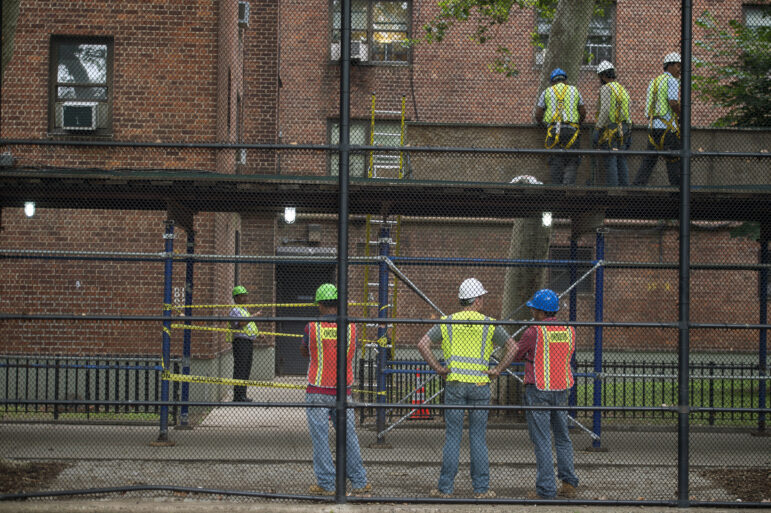Over the next 100 days, NYCHA will hold engagement sessions so Nostrand Houses tenants can learn more about each of the ballot choices. On Nov. 8, the 30-day voting process will begin. Residents can vote online or by mail during the first 20 days, while the last 10 days will take place in-person.

Demetrius Freeman/Mayoral Photography Office.
Construction workers outside Brooklyn’s Nostrand Houses in 2015.
Residents at NYCHA’s Nostrand Houses in the Sheepshead Bay neighborhood in Brooklyn will be the first group of tenants to vote on whether to participate in the Public Housing Preservation Trust initiative.
On Thursday, tenants were sent a “Notice of Vote” by mail from NYCHA alerting them of an upcoming vote that will start in November, according to the mayor’s office. The notice included information on the purpose of the vote, schedules of outreach meetings, dates and times for the vote and options on the ballot.
The Trust, officials say, will be able to access additional funding NYCHA currently doesn’t have access to, and issue bonds to borrow money to fund capital repairs, of which the public housing system needs an estimated $78.3 billion to adequately address.
For the vote, tenants can tick off one of three options: transfer to Preservation Trust, convert to the Permanent Affordability Commitment Together (PACT) program—which puts NYCHA developments under private management—or stay in traditional Section 9 public housing.
NYCHA selected a third-party vendor, MK Services, to watch over the election process. At least 20 percent of households at a given campus will need to participate in the vote for the results to be binding, a threshold critics have argued is too low.
Over the next 100 days, NYCHA will hold engagement sessions so Nostrand Houses tenants can learn more about each of the ballot choices. On Nov. 8, the 30-day voting process will begin. Residents can vote online or by mail during the first 20 days, while the last 10 days will take place in-person.
Household heads or tenants who are 18 years or older are eligible to vote.
Compared to other developments in the NYCHA portfolio, Nostrand Houses lagged behind in terms of its physical needs: On a per-unit basis, the Brooklyn campus is worse off than 80 percent of other public housing developments, with 20 years worth of capital needs. The estimated cost to rehabilitate is $600 million, according to the mayor’s office.
“Just over one year ago, I stood with residents of Nostrand Houses to celebrate our success in getting the Trust passed in Albany, and, today, we are announcing that they will have the first opportunity to vote to have their homes repaired through the Trust,” Mayor Eric Adams said in a statement.
Last month, Preservation Trust made strides by holding its inaugural board meeting. The board, which has seven members, includes Barbara McFadden, the tenant association president at Nostrand Houses. “I personally organized rallies and trips to Albany, with hundreds of fellow residents demanding the Trust,” McFadden wrote in an Op-Ed for City Limits last year. “I have seen first-hand the overwhelming resident support.”
But not all tenants and advocates are on board with the plan, calling instead for the city, state and federal governments to fund repairs at NYCHA directly.
Lisa Bova-Hiatt, NYCHA’s chief executive officer and Preservation Trust Chair said residents will have a “true voice” in the future of their homes.
“We are thrilled to join residents on this journey and to present them with modernization options, including the newly established Public Housing Preservation Trust, for improving conditions and contributing to an enhanced quality of life.”








